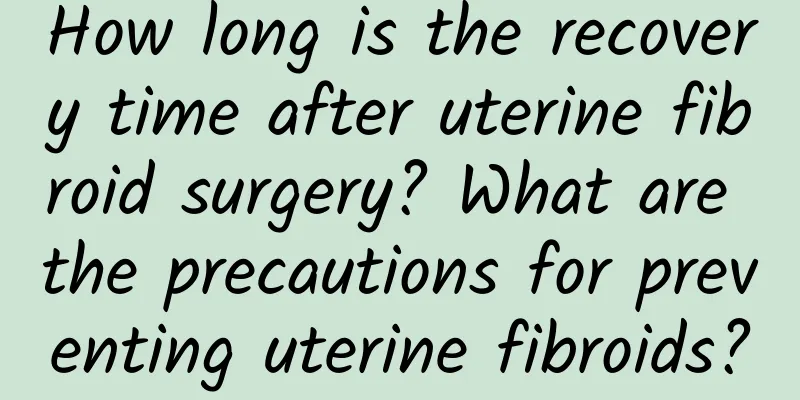What is uterine fibroids? What is the most common tumor?

|
What is uterine fibroids? What is the most common tumor? Understanding uterine fibroids Uterine fibroids are one of the most common benign tumors in women. They usually occur in the myometrium of the uterine wall of women of childbearing age. For many women, they may not be unfamiliar. So what are general uterine fibroids? What kind of tumor is uterine fibroids? This article will introduce the definition, characteristics and some common treatment methods of uterine fibroids in detail. 1. What are uterine fibroids? Uterine fibroids are tumors formed by the proliferation of smooth muscle cells in the uterine wall. These muscle cells continue to proliferate and divide, eventually forming one or more lumps. The size and number of these lumps will vary from person to person. General uterine fibroids refer to tumors of moderate size and small number. 2. Symptoms of uterine fibroids Uterine fibroids usually develop in women of childbearing age and may grow larger as they age. Common uterine fibroids may cause the following symptoms: - Severe menstrual cramps: Uterine fibroids can cause an increase in the thickness of the endometrium, which in turn increases the likelihood of menstrual cramps. - Frequent and urgent urination: Uterine fibroids may compress the bladder, causing frequent and urgent urination. -Irregular periods: Uterine fibroids may cause irregular periods, including heavy or prolonged periods. -Pressure and discomfort: Larger uterine fibroids may put pressure on surrounding organs, causing abdominal discomfort and pain. 3. Treatment of uterine fibroids Uterine fibroids usually require treatment, and the specific treatment method depends on factors such as the patient's age, the severity of symptoms, and fertility plans. The following are some common treatments: -Observation: For patients with no symptoms or mild symptoms, your doctor may recommend regular checkups because many uterine fibroids can shrink on their own. -Medication: Some medications can help reduce the size of uterine fibroids or control their growth. For example, progesterone drugs can inhibit the secretion of estrogen, thereby reducing the growth of uterine fibroids. - Surgery: For uterine fibroids that are large or cause significant symptoms, surgery may be necessary. Common surgeries include myomectomy and hysterectomy. Pay attention to women's health and treat uterine fibroids in time Uterine fibroids are usually small uterine tumors of moderate size. Uterine fibroids can cause various symptoms, such as severe dysmenorrhea, frequent urination, and urgency. Treatments for uterine fibroids include observation, medication, and surgery. If you have the above symptoms or suspect you have uterine fibroids, please consult a doctor as soon as possible for timely diagnosis and treatment. Pay attention to women's health and keep us away from the troubles of uterine fibroids. |
<<: What is the situation of irregular uterine fibroids? What does irregular uterine fibroids mean?
>>: What is the best dinner for uterine fibroids? Daily diet for uterine fibroids
Recommend
Can I do yoga when I have dysmenorrhea?
Can I do yoga when I have dysmenorrhea? Dysmenorr...
What to eat to prevent the recurrence of uterine fibroids What to eat to prevent the continued growth of uterine fibroids
What to eat to prevent the recurrence of uterine ...
Can’t I be hospitalized for ectopic pregnancy?
Can’t I be hospitalized for ectopic pregnancy? 1....
What is the recurrence rate after myomectomy?
What is the recurrence rate after myomectomy? 1. ...
What are the basic symptoms of irregular menstruation?
What are the symptoms of irregular menstruation? ...
What medicine can cure cervical erosion quickly and effectively?
What medicine can cure cervical erosion quickly a...
Bartholin's gland cyst in adolescence
Bartholin's gland cysts in adolescence can be...
Can dysmenorrhea be cured?
Can dysmenorrhea be cured? This is something that...
How long does it usually take for abdominal pain to occur in an ectopic pregnancy? Let's find out.
The time when ectopic pregnancy induces abdominal...
How long after the abortion can I go back to work?
In recent years, with the development of medical ...
What should I do if a lump grows on the skin of my labia? Analyze the cause and treat it accordingly
If the lump on the female labia skin is caused by...
Vulvar itching is one of the most common symptoms of chronic vaginitis. What are the causes of vulvar itching?
After discovering their own symptoms of chronic v...
Is it necessary to diet and starve yourself to lose weight? Study: Drinking water at this time doubles the weight loss effect
Is it necessary to diet and starve yourself to lo...
What is the difference between early miscarriage and menstruation?
There are certain differences between early misca...
Where to get anesthesia for female abortion Four basic common senses about female abortion
Nowadays, people's sexual concepts have becom...









